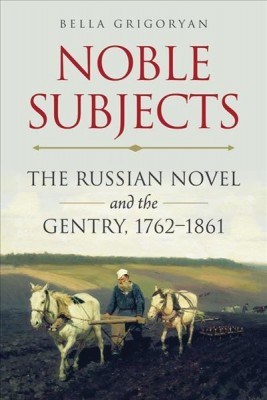| Noble Subjects: The Russian Novel and the Gentry, 1762-1861 Contributor(s): Grigoryan, Bella (Author) |
|
 |
ISBN: 0875807747 ISBN-13: 9780875807744 Publisher: Northern Illinois University Press OUR PRICE: $44.50 Product Type: Paperback - Other Formats Published: February 2018 |
| Additional Information |
| BISAC Categories: - Literary Criticism | Russian & Former Soviet Union - History | Russia & The Former Soviet Union |
| Dewey: 891.730 |
| LCCN: 2018288541 |
| Physical Information: 0.6" H x 5.9" W x 9" (0.70 lbs) 192 pages |
| Themes: - Cultural Region - Russia |
| Descriptions, Reviews, Etc. |
| Publisher Description: Relations between the Russian nobility and the state underwent a dynamic transformation during the roughly one hundred-year period encompassing the reign of Catherine II (1762-1796) and ending with the Great Reforms initiated by Alexander II. This period also saw the gradual appearance, by the early decades of the nineteenth century, of a novelistic tradition that depicted the Russian society of its day. In Noble Subjects, Bella Grigoryan examines the rise of the Russian novel in relation to the political, legal, and social definitions that accrued to the nobility as an estate, urging readers to rethink the cultural and political origins of the genre. By examining works by Novikov, Karamzin, Pushkin, Bulgarin, Gogol, Goncharov, Aksakov, and Tolstoy alongside a selection of extra-literary sources (including mainstream periodicals, farming treatises, and domestic and conduct manuals), Grigoryan establishes links between the rise of the Russian novel and a broad-ranging interest in the figure of the male landowner in Russian public discourse. Noble Subjects traces the routes by which the rhetorical construction of the male landowner as an imperial subject and citizen produced a contested site of political, socio-cultural, and affective investment in the Russian cultural imagination. This interdisciplinary study reveals how the Russian novel developed, in part, as a carrier of a masculine domestic ideology. It will appeal to scholars and students of Russian history and literature. |